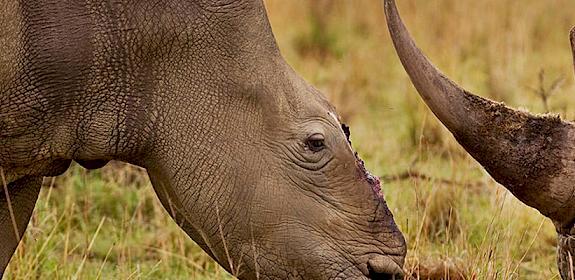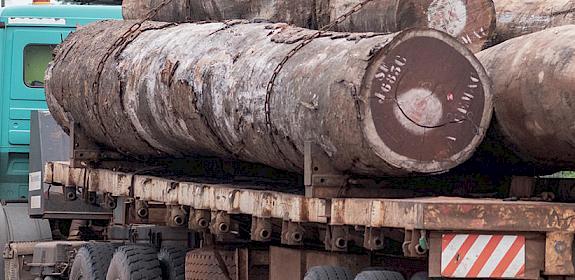China joins Tanzania and Malawi in efforts to curb illegal wildlife trade
Lilongwe, Malawi and Dar es Salaam, Tanzania, 7th June 2018—Two advocacy workshops raising awareness on wildlife trafficking amongst Chinese nationals living and working in Malawi and Tanzania were jointly hosted by China’s State Forestry and Grassland Administration(SFGA), China’s CITES[1] Management Authority(CITES MA), TRAFFIC and WWF, supported by the Chinese Embassies in Lilongwe and Dar es Salaam.
More than 180 local Chinese nationals from State-owned enterprises, private businesses and residential communities attended the workshops. Local wildlife conservation authorities and both local and international media were also present. Meng Xianlin, Director General of CITES MA in China, Wang Xiusheng, Charge D’affaires, Embassy of China in Malawi, Brighton Kumchedwa, Director General of Department of Parks and Wildlife of Ministry of Natural Resources, Energy and Mining of Malawi, and Xu Chen, Minister Counsellor, Embassy of China in Tanzania, Milanzi, Permanent Secretary of Ministry of Natural Resources and Travel of Tanzania made the opening remarks at the respective workshops.
Each year, Tanzania attracts global tourists to view the natural wonder of seasonal migration of wild animals across the Serengeti grasslands, home to over 20 migratory species, including the African Elephant.
Tanzania is a major gateway to the interior of East Africa and has had a long-term relationship with modern China since the 1960s. Dar es Salaam is one of the key African port cities on the “Ocean Silk Road” (China’s infrastructure development initiative) and also the starting point of the Tanzania-Zambia Railway built by Chinese development assistance to Africa in the 1970s.
As Chinese investment in Africa has expanded in recent years, incidences of ivory smuggling cases involving Chinese nationals have happened occasionally. Such cases have tarnished China’s international reputation, particularly with a rising consciousness that illegal wildlife trade poses a serious threat to the survival of Africa’s wild elephants. Local governments have imposed tough penalties upon such crime.
Malawi is one of the few countries in Southern Africa that has relatively stable African Elephant populations, and the Malawi government has put strong measures in place to deter poaching and illegal ivory trade. In 2016, Malawi symbolically burned 2.6 tonnes of confiscated elephant tusks valued at nearly USD3 million.
Li Shuming, Vice Minister of China’s State Forest and Grassland Administration delivered a written statement towards the poaching and smuggling activities targeting African elephants, rhinos, pangolins and rare timbers happened time to time in recent years, which has become an issue concerned globally. He said The Chinese government considers this as high priority by regulating business operation, the trade controls in China are more restricted than the international conventions: banning rhino horn and tiger bone, suspending ivory imports, and banning the ivory commercial processing and sales completely domestically,, monitoring markets and transportation links, increasing border inspection. Chinese government has also conducted explored long-term mechanisms on education work both in domestic and abroad to improve the Chinese nationals working and living in Africa ‘s awareness of wildlife conservation and law-abiding.
Representatives from China’s CITES MA spoke about China’s implementation of CITES, and highlighted the implications of the Chinese domestic ivory trade ban and domestic legislation on wildlife protection. TRAFFIC representatives from offices in Tanzania and China respectively spoke about global trends in illegal wildlife trade and typical wildlife crime case studies.
Wang Xiusheng, Charge D’affaires of Chinese Embassy to Malawi, said: “Chinese government has implemented a total ban on domestic commercial processing and sales of ivory and products from December 31,2017, it is a sign of China's consistent position of wildlife conservation and combating illegal ivory trade. China has demonstrated its commitment to wildlife conservation as a responsible country. The rise of a great country shares the responsibility with its citizens, and we have the responsibility and obligation to contribute to the development of Malawi’s wildlife reserves, its ecotourism, and environment. ”
The Minister Counsellor of the Chinese Embassy to Tanzania, Xu Chen said: “The Chinese Embassy in Tanzania has long been a supporter of the Tanzanian government's work in wildlife conservation. In February last year, the Chinese Embassy held a public hiking event called ‘running for elephants’, which calls for resisting illegal wildlife trade, including ivory. In February this year, the Chinese Embassy and the Ministry of Natural Resources and Tourism jointly organized the China-Tanzania Forum on Wildlife Conservation and Tourism Development, which aims to deepen the exchange and strategic cooperation, to support the protection of natural resources.“
He also expressed his expectation that the workshop would help raise awarenss of relevant legislation and of wildife conservation.
"We must work with the Tanzanian people to protect the land," he said.
From this year, legal ivory is no longer available in China. In addition, any attempt to bring ivory from abroad is illegal and will be punished by law,” said Zhou Fei, Head of TRAFFIC’s China Office and WWF China Conservation Programme Officer “Ivory items are simply not options as souvenir or gifts for international travellers
Minister Counsellor of the Chinese Embassy to Tanzania, Xu Chen
During the visits, constructive bilateral consultations also took place between China’s State Forestry and Grassland Administration and their counterparts in Malawi and Tanzania respectively. Both sides recognised their shared responsibility in ensuring compliance with CITES regulations and agreed to strengthen information exchange and wildlife conservation advocacy to prevent the poaching and smuggling of illegal wildlife products.
At the end of the workshop, the statement to say no to illegal wildlife trade was announced by the representatives of the local Chinese nationals and companies in Malawi and Tanzania.
The two workshops help to raise awareness among Chinese citizens based in Malawi and Tanzania about wildlife conservation in general and protection of African Elephants in particular.
This was the 11th outreach workshop of its kind jointly conducted by WWF/TRAFFIC and SFGA in collaboration with various Chinese Embassies in Africa. The first took place in Kenya in January 2014.




